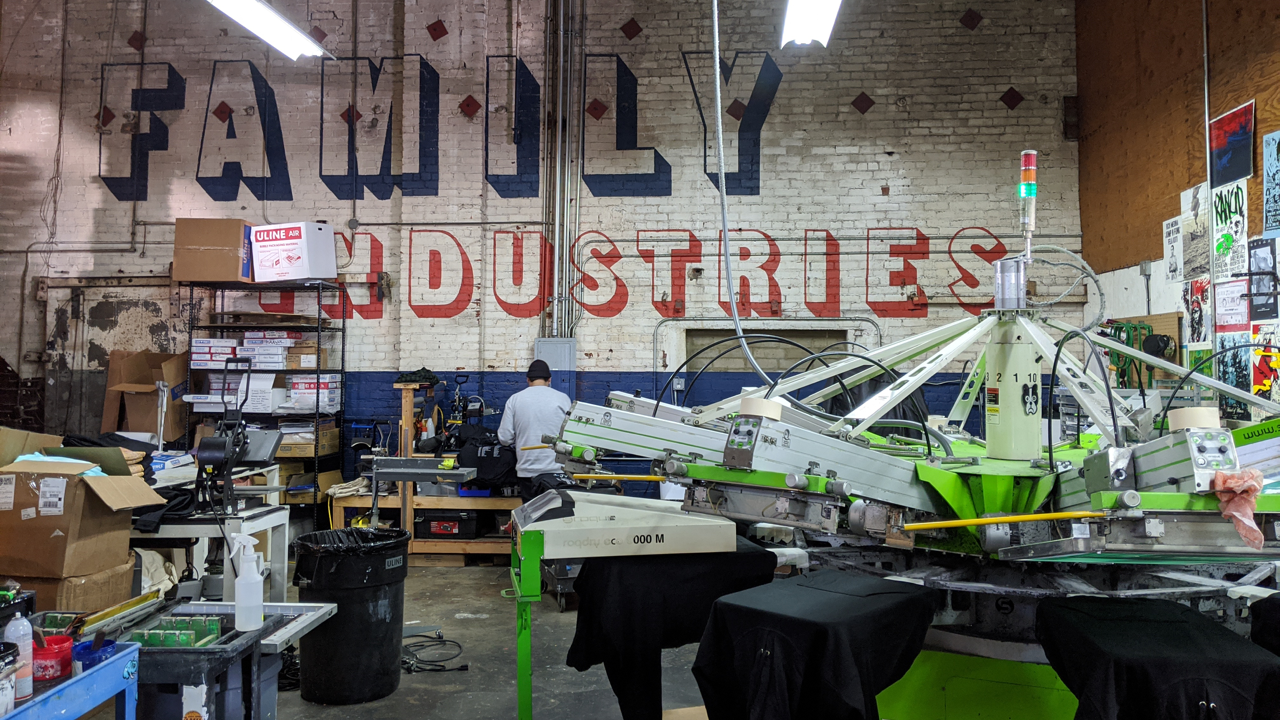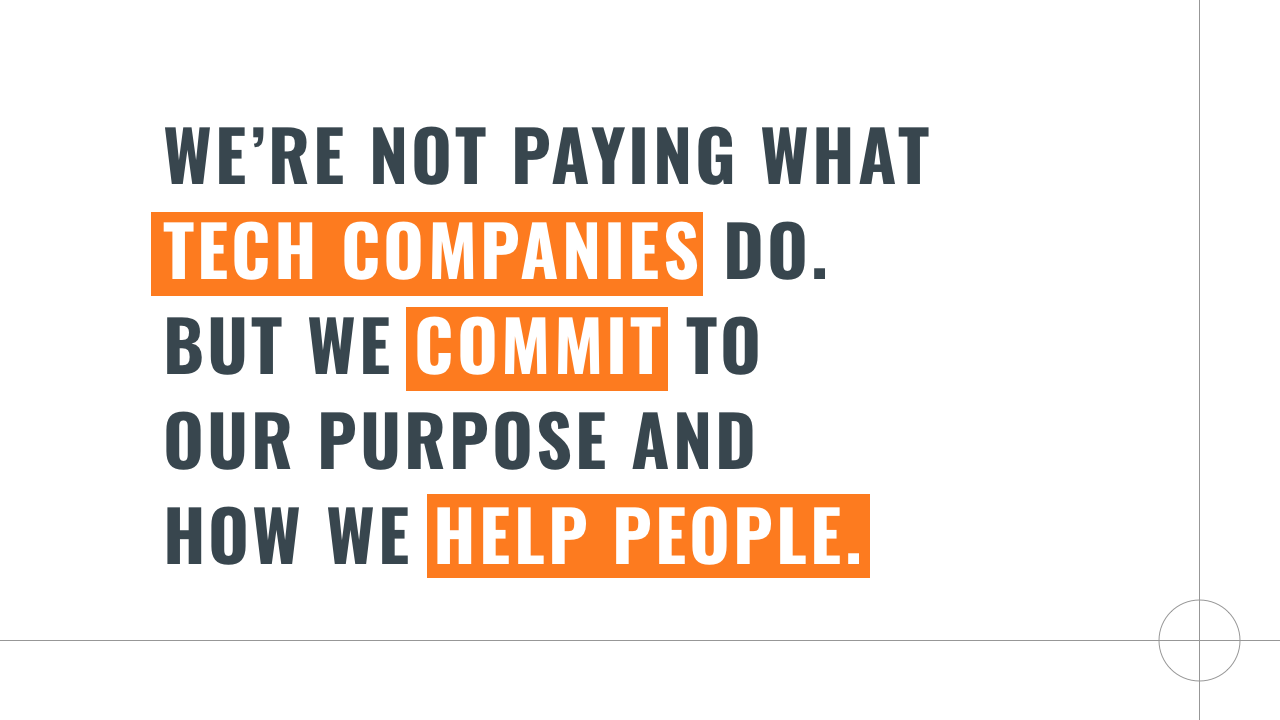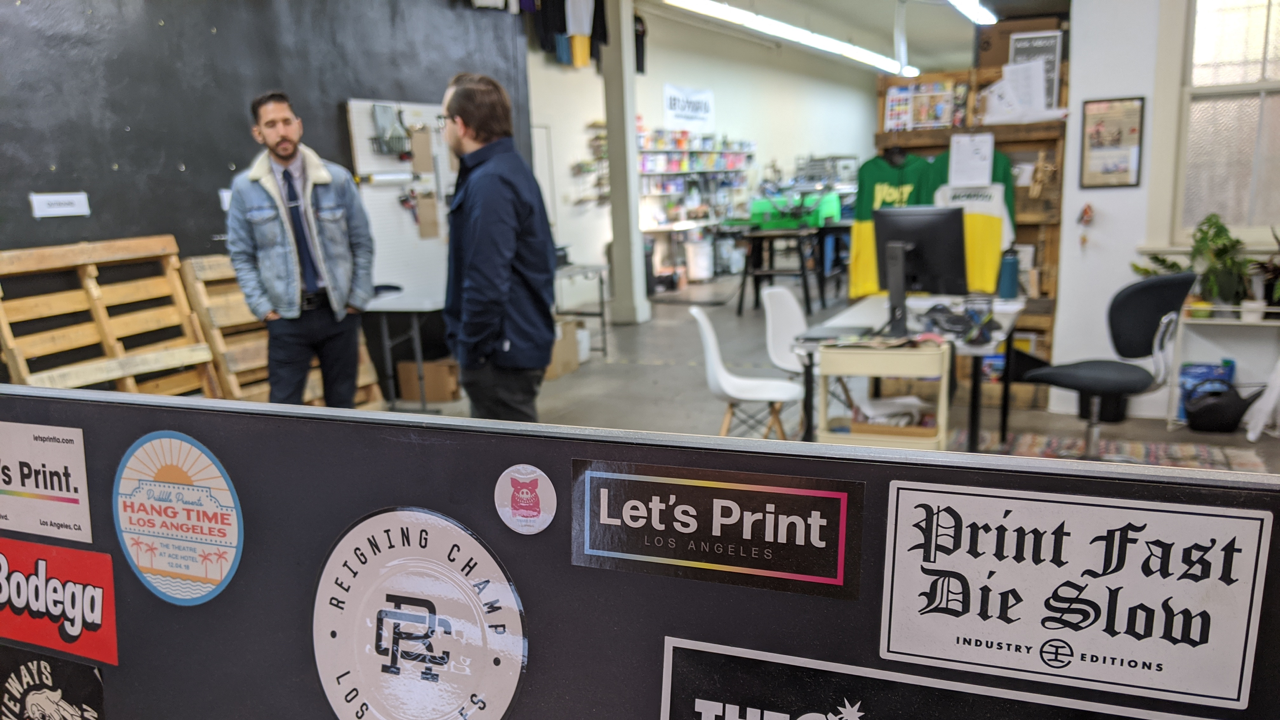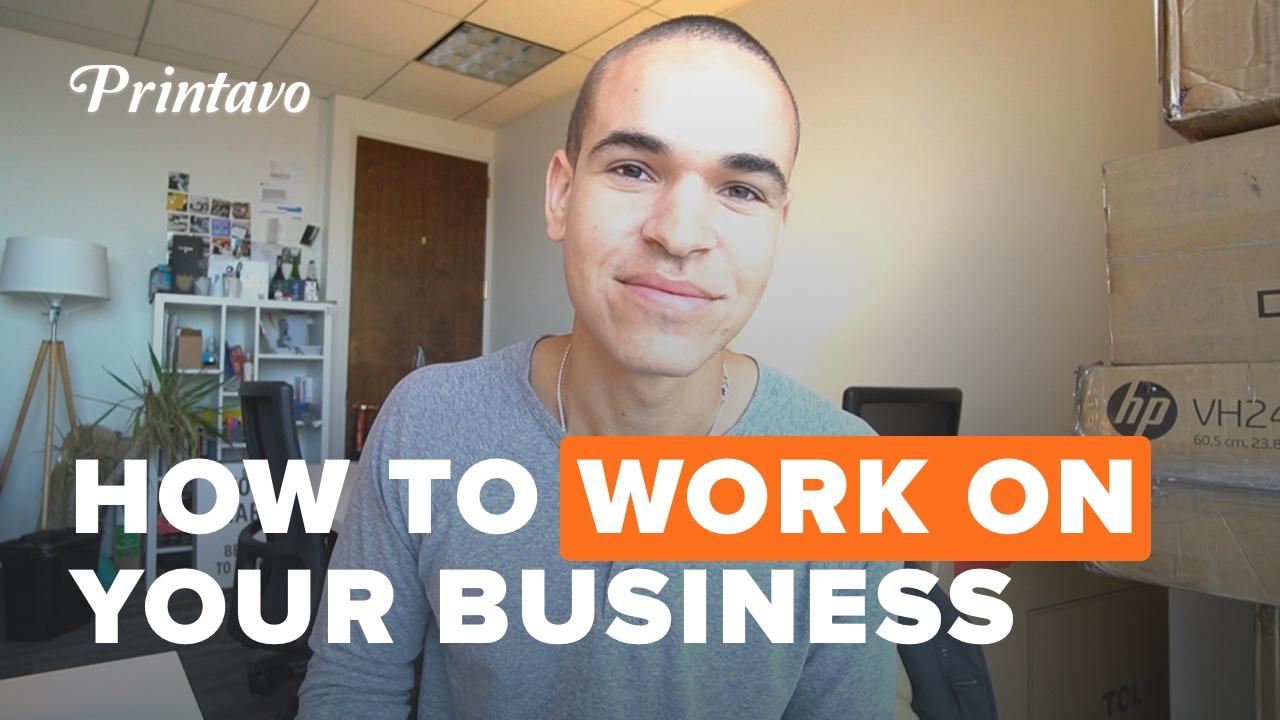The way to grow your screen printing business is to work on the business – not in the business. This idea gets talked about a lot among small business owners, with the question boiling down to: “How do I actually work on my business?”
If you want to create a company that’s durable, profitable, and runs on it own – it’s not enough to be a good screen printer. You have to put in high-value work around finances, people, processes, and delegation.
There are always problems when you run and own your business. New, different, exciting, frightening problems crop up every day. That’s the magic of screen printing – every job is different, every time. There is always something to learn.
But the most valuable work a screen print shop owner can do involves working on the business. Not running the press, putting out tiny fires, or filling in for a sick employee. Sometimes you will have to do those things…it’s inevitable…
But if you want to make a screen printing business that will generate wealth for you and your family over the long-term, think about the small, persistent actions you can take that add up to something much larger.
Building a successful screen printing business: like being an elite athlete
If you’ve ever trained for a marathon, started a new diet, or just challenged yourself to use the gym more, then you already know that you can’t just put in a month’s work and reap the benefits. Athletes know that success involves three core components:
- Fuel: a good diet
- Activity: an exercise regimen and focused practice
- Dedication: a long-term commitment
Great athletes don’t play their first game as a fully developed professional.
Their triumphs come through a long-term focus on growth and development. The same thing is true for screen printers. Your first print jobs are just the beginning of your journey.
So the takeaway here is this: working on your business means developing good habits that you can keep for a long time.
You cannot expect to arrive on day 1 – or day 1,000 for that matter – with everything you need to succeed. It takes a growth mindset: you are never finished, always looking for improvement, and deeply believe that you can grow and change.
Finances: you have to turn a profit
At the end of the day, it doesn’t matter how good your prints are if you’re not turning a profit in your screen printing business. Profits are the fuel that drive your business and make it worthwhile. They are the reward for taking on the risk of starting a business.
Profitability and cash-flow security are the North Star for screen printing businesses. With extreme seasonality, cash-flow variability, and extremely low margins – it’s essential to develop a system for managing your money from the outset.
This is, perhaps surprisingly, a really common issue among screen printers – they’re either not making enough money to truly turn a profit, or they’re struggling with cash-flow issues. Business finance is not easy, but there’s no lack of resources to help you either.
You can do two things today to work on your business:
- Implement the Profit First system to automatically turn a profit
- Watch Profit First at Printavo’s PrintHustlers Conf 2019
- Join the Profit First for Screen Printers group on Facebook
- Only print orders with 100% down-payment
- This is a must-have for screen printing businesses in 2020: 100% down-payment required
- Don’t be squeamish – 100% down is what customers expect!
People: the backbone of a successful screen printing business

We interviewed 15+ screen print shop owners at Impressions Expo 2020 – shops of every size, in every area of the US, with wildly diverse customers and businesses.
The single unanimous theme across the screen printing industry in 2020 is that managing, hiring, and keeping great people in your screen printing business is extremely difficult.
Why? Screen printing isn’t on the radar as a career path for many people. A lot of great employees may not even consider the industry a viable option. Pay may be low, the work may be hard, and the hours can be long. Some candidates don’t even know that screen printing is a viable industry, much less a great career.
But that doesn’t mean it’s impossible to hire great people. Screen printing companies like Superior Ink, Marathon Sportswear, and Printed Threads have all kept turnover extremely low for more than 5 years.
Core insight
If a team member isn’t working for your business – for its goals, its values, its mission – then they are working against your business. Some people are not a good fit.
So who should you try to hire for your screen printing business? There are four key types of people that can quickly adapt to life in a screen printing business – and can help you get out of trenches.
- Managers
- Even people from outside the industry can excel in screen printing
- Look for project managers and people from demanding industries like warehousing
- Physical laborers (and people from physically challenging jobs)
- Many laborers would be thrilled to work reliable hours in a less physically demanding setting
- Dog groomers, construction workers, gig workers, etc.
- High-school and college dropouts
- This untapped talent pool can be reliable and intelligent – school isn’t everything
- Hire for talent and attitude, train for skill
- Spanish-speaking employees
- Mike Chong advises screen printers to look beyond English-speaking employees to find truly wonderful people
This all boils down to thinking about your print shop’s culture.
Culture is a bit of a vague concept, but it’s best simplified this way: your company’s culture is the way your employees feel at work, what they consider acceptable, and how they relate to the work they do.
Some ways that other screen printing business have retained their staff and built a great culture include:
- Regular 1-on-1 meetings
- Simple meetings with your team members for 10 to 15 minutes bi-weekly to discuss life and work
- Bonuses
- Yearly bonuses for great work
- Fair wages
- Pay above market rates
- Offer benefits if possible
- Promotions
- Have a clear pathway for progress for each employee
- Offer opportunities to high performers
- Regular team activities
- Build your team from within by humanizing each other outside of work
- Learning days
- Let your best employees attend seminars, trade shows, and educational events
- Try a new type of printing, i.e. learning water-based inks
- Print-your-own opportunities
- Consider low-cost or free equipment use for employees to print their own projects
- Personal time
- Offer (paid or unpaid) time away from the shop that isn’t sick time or vacation time
- An “owner” mentality
- Do your employees “own” their projects – or do they just “do” them?
- Ownership implies responsibility and generally creates much higher-quality work
- Open communication
- Will your employees point out problems?
- Do your employees feel safe telling the truth, disagreeing, or advocating for what they need to do a better job?
- How do you usually find out when something went wrong?
If you can’t stop to think about the Big Picture…it’s time to re-double your efforts at hiring, training, and educating your staff.
You cannot work on your screen printing business if you don’t have people to help you accomplish mission critical day-to-day tasks. That’s why trustworthy, well-compensated, positive people are essential to letting you take the steps to work on developing and improving your business.
Process-first screen printing: can you take a vacation?

Here’s a gut-check for any screen print shop owner: can you leave the shop for a day? How about a week? What about a month?
If that sounds impossible, it’s time to look at the overall processes in place within your shop. This typically involves three discrete operations:
- Customer-facing operations
- Sales, communications, order intake, artwork, quoting, invoicing, customer education, marketing, social media
- Printing operations
- Screen burning and reclaiming, printing, quality control, packaging
- Management operations
- Scheduling, procurement, equipment maintenance, technique standardization, training
The shop owner exists within all three aspects of the business through the processes they implement.
Question 1: So how do you actually make processes for a screen printing business?
You could have a detailed employee handbook, an online guide like a shop Wiki, use Printavo’s custom Invoice Statuses to craft your workflow, build a webpage, write a detailed FAQ, or even just create posters for each department.
Question 2: Why bother with putting process first in your screen printing shop?
It’s important that everyone in your business knows where to get information they need.
The best processes are well-understood by everyone in the business, meticulously documented, visually charted when necessary, and easily available to anyone within the business that needs them.
Question 2: Where should a business owner start developing processes?
Start today. For the next week, spend 15 minutes at the end of each work day documenting the following things:
- How you spend your time
- Your 15 most common tasks
- Every question you’ve been asked more than 3 times in a week
- Things you’d like to do more of
- Things you’d like to do less of
- Things you’re actually good at
- What you meant to do in a day
- What you actually get done in a day
Question 4: Which processes should you start documenting?
Profitable screen printing processes establish patterns, answer questions, and leave no uncertainty around how and why a task is performed.
Begin offloading the processes that are low-value, time-consuming, or simply something you don’t like doing or aren’t very good at.
Pro tip: Document every question you are asked during a week. If a question is asked 3 times, you need a process in place to resolve that question.
Delegation: what if you can’t be there?
So you’ve crafted processes – but that’s not enough.
Someone has to own those processes for them to thrive. There will be processes you can own (hiring, delegation, and ongoing audits of your own processes are great ways to spend your time), but many of the processes need to be handled by a departmental lead.
If you’re just beginning to delegate, begin by creating clear boundaries between each department in your shop. Why? Because you want the people in each department focused on what they do. If you’re a small shop just starting out, you can do this early and get an advantage – even if it’s just you and a friend.
If you’re further along in your business, look to your existing staff before bringing in new blood. Who are the leaders? Who is highly competent? Who are the high-performers? Who do people like to work with? These are the people you can begin delegating small tasks to.
The goal of delegation is simple, but getting there is hard: the business should continue on without you. The correct decisions should continue being made regardless of whether you’re present or not.
But let’s be clear. Delegation is not optional. It is a necessity. The sooner you become comfortable issuing instructions, offering clear feedback, and knowing when to delegate lower-value tasks, the sooner you can trust your staff to operate the business without you.
How big companies grow – you can, too

Whether your screen printing business is big or small, your mission as the owner is to envision what your company should be. This is your chance to dream big and make a genuine impact.
Big companies grow by setting a goal and using their values to get there. You can use values as a guidepost in your printing business, no matter what size it is or how long you’ve owned it.
Practically, this means creating a set of values that guide the activities of every employee within your company. We’ve covered several ways to begin this process of working on your business (and it is a process), but there are important lessons you can learn from big companies.
- Discuss your values openly
- How will your employees know what your values are if you never discuss them?
- Can your employees explain your business’ values to you?
- Display your values in your business
- It may be a little cliche, but post signs or art around your shop that reflect your values.
- Let your values guide your social media messaging, advertising, branding, and more.
- Write your value statement
- Your values should be clear, succinct, and obvious.
- Need a boost? Here’s an exercise: “We help (your specific customer) to (do something) by (using our secret sauce).” Fill out the underlined parts with specifics for your business.
- Repeat your values often
- You can’t just talk about values once, post something in your shop, and walk away.
- Your values should come up again and again – a theme in your business.
Clear values answer questions, guide action, and simplify every part of being an employee. “Does this align with our values? Is this the right thing to do? Is this the way we do things in our shop?” – your values answer all of these questions and more.
You may think your values are obvious. But they’re not – they’re something you have to relentlessly discuss, pursue, and act on. Your values are the foundation that your culture is built on. Make your values obvious, clear, and omnipresent.
What if you get sick, get hurt, or have an emergency?
You are a human. Things happen that are beyond your control. Inevitably, you’ll need to take time away from your business – whether due to illness, emergency, or just a vacation.
Some screen print shops have to stop operations completely when the owner leaves. But it doesn’t have to be this way.
Like an elite athlete, the best screen print shop owners have built a three-pronged system for success that includes fuel, activity, and long-term dedication. Here’s what that looks like:
- Fuel: profit, values, customer and employee relationships
- The things that keep you going, the “why”
- Activity: crafting processes and standards, examining what worked and what didn’t, honest introspection, getting feedback
- The things you do to keep getting better, the “how”
- Dedication: ongoing high-value efforts, being a “learning organization,” long-term vision
- The long-term persistence.
What is today’s acorn? Or: why small actions matter more than you think

Several years ago, a major cell phone company in California received reports of poor signal around one of its antennas.
When workers opened the antenna to diagnose the problem, they discovered hundreds of pounds of acorns stored in the antenna box. The culprit? One lonely acorn woodpecker, a single bird that weighs just three ounces.
The lowly woodpecker had stored hundreds of pounds of acorns, totally ruining the antenna after 5 years of daily acorn stashing.
The lesson? Small, persistent, repetitive actions – habits – add up to something stunning and powerful over time. Even by a three-ounce bird.
Working on your business relies on the same principle.
You don’t need to accomplish everything at once. You just need to complete one high-value task – “today’s acorn” – that only you can complete.
Make this a habit and your small, persistent, ongoing actions will always defeat a single Herculean effort.
What’s today’s acorn? Go work on your screen printing business.
Enjoyed this? Read my last piece on how to focus in your screen printing business.


0 Comments